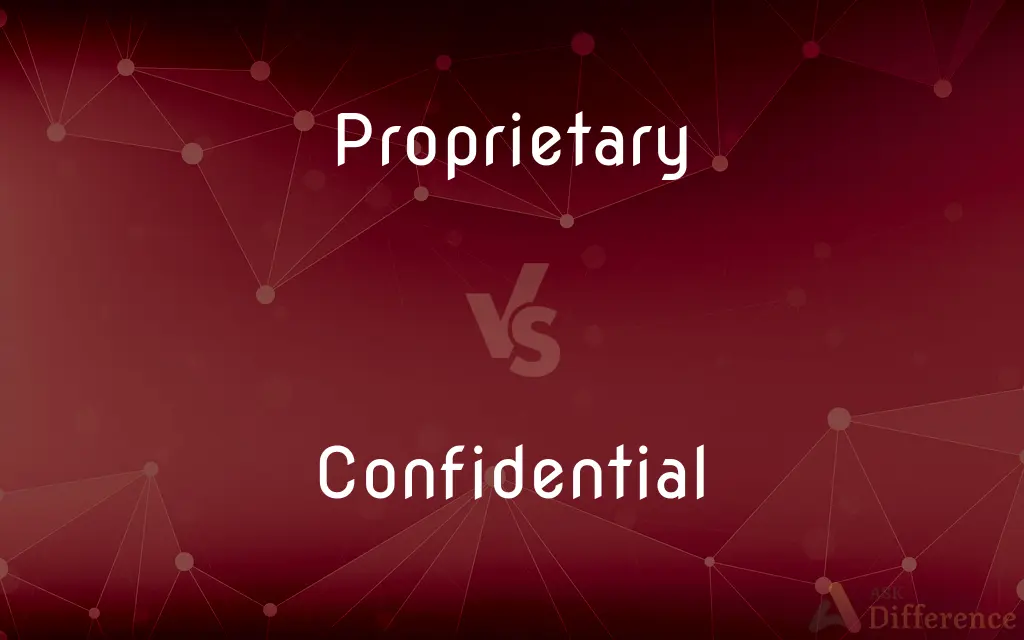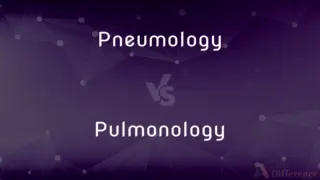Proprietary vs. Confidential — What's the Difference?
Edited by Tayyaba Rehman — By Fiza Rafique — Updated on March 7, 2024
Proprietary refers to ownership or rights held by a person or company, often for products or intellectual property, while confidential pertains to information meant to be kept secret or private, often to protect privacy or competitive advantage.

Difference Between Proprietary and Confidential
Table of Contents
ADVERTISEMENT
Key Differences
Proprietary information relates to inventions, designs, and processes owned by an individual or a company, emphasizing exclusivity and rights to use and sell. This can include patents, trademarks, and copyrights, which are legally recognized forms of protection for creators and owners. On the other hand, confidential information encompasses a broader category of data and knowledge that is not necessarily owned but is considered sensitive and is protected from being disclosed to unauthorized parties. This could include personal data, business strategies, client lists, and trade secrets.
While proprietary information often has a clear legal definition and protection under intellectual property laws, ensuring the owner has exclusive rights to their inventions or creations, confidential information relies on confidentiality agreements and privacy policies to prevent unauthorized sharing. Confidential information can be proprietary, but not all proprietary information is necessarily treated as confidential, depending on its exposure and usage in the public domain.
Proprietary information is usually developed with the intention of public disclosure through patents or trademarks, aiming for legal protection and public acknowledgment of ownership, whereas confidential information is often intended to remain undisclosed to maintain competitive advantage, privacy, or security. The protection of proprietary information through legal means like patents also publicly discloses the information, unlike confidential information which remains undisclosed to protect its value.
Businesses often mark documents or data as "proprietary" when they contain information that gives them a competitive edge and is unique to their operations, signifying ownership and rights over such information. Conversely, the label "confidential" is applied to information that, while it may not be owned by the business, is critical to its operations and must be protected from competitors and the public to safeguard the business's interests.
The management of proprietary and confidential information involves different legal and security measures. Proprietary information is protected through intellectual property laws, requiring registration and legal actions to enforce, while confidential information is protected through non-disclosure agreements and privacy policies, emphasizing the ethical and contractual obligation not to disclose.
ADVERTISEMENT
Comparison Chart
Definition
Ownership or rights held by a person or company.
Information meant to be kept secret or private.
Legal Protections
Protected by intellectual property laws.
Protected by confidentiality agreements and privacy policies.
Purpose
To establish ownership and exclusive rights to use and sell.
To protect privacy or competitive advantage.
Public Disclosure
Often disclosed through patents or trademarks.
Intended to remain undisclosed to maintain value.
Examples
Patents, trademarks, copyrighted material.
Personal data, business strategies, client lists, trade secrets.
Compare with Definitions
Proprietary
Exclusive Use and Sale.
Proprietary technology developed by the firm is now licensed to others.
Confidential
Security Measures.
Confidential data is encrypted to prevent unauthorized access.
Proprietary
Legal Recognition.
Proprietary formulas for medications are closely guarded by patents.
Confidential
Privacy or Secrecy.
Employee records are considered confidential information.
Proprietary
Ownership and Rights.
The company holds proprietary rights to its new software, preventing others from copying it.
Confidential
Ethical and Contractual Obligation.
Signing a confidentiality agreement is required to access the confidential documents.
Proprietary
Intellectual Property Protection.
Their latest invention is proprietary and protected by a patent.
Confidential
Protection of Competitive Advantage.
Confidential business strategies are vital for maintaining market position.
Proprietary
Public Disclosure.
The proprietary design was published in a patent application.
Confidential
Sensitive Information.
The client list is confidential and not disclosed to the public.
Proprietary
Relating to an owner or ownership
The company has a proprietary right to the property
Confidential
Intended to be kept secret
Confidential information
Proprietary
(of a product) marketed under and protected by a registered trade name
Proprietary brands of insecticide
Confidential
Done or communicated in confidence; secret.
Proprietary
Of or relating to a proprietor or to ownership
Had proprietary rights.
Confidential
Entrusted with the confidence of another
A confidential secretary.
Proprietary
Privately owned, as a business
A proprietary hospital.
Confidential
Denoting confidence or intimacy
A confidential tone of voice.
Proprietary
Owned by a private individual or corporation under a trademark or patent
A proprietary drug.
Confidential
Containing information, the unauthorized disclosure of which poses a threat to national security.
Proprietary
A proprietor or group of proprietors.
Confidential
Kept, or meant to be kept, secret within a certain circle of persons; not intended to be known publicly
The newspaper claims a leaked confidential report by the government admits to problems with corrupt MPs.
Proprietary
Ownership; proprietorship.
Confidential
(dated) Inclined to share confidences; (of things) making people inclined to share confidences; involving the sharing of confidences.
Sitting in front of the fire, they became quite confidential, and began to gossip.
Proprietary
A proprietary medicine.
Confidential
(dated) Having someone's confidence or trust; having a position requiring trust; worthy of being trusted with confidences.
A confidential agent; a confidential servant; a confidential whisper
Proprietary
One granted ownership of a proprietary colony.
Confidential
Enjoying, or treated with, confidence; trusted in; trustworthy; as, a confidential servant or clerk.
Proprietary
Of or relating to property or ownership.
Proprietary rights
Confidential
Communicated in confidence; secret.
Proprietary
Owning something; having ownership.
The proprietary class
Confidential
Entrusted with private information and the confidence of another;
A confidential secretary
Proprietary
Created or manufactured exclusively by the owner of intellectual property rights, as with a patent or trade secret.
The continuous profitability of the company is based on its many proprietary products.
Confidential
(of information) given in confidence or in secret;
Closet information
This arrangement must be kept confidential
Their secret communications
Proprietary
Nonstandard and controlled by one particular organization.
A proprietary extension to the HTML standard for Web page structure
Confidential
Denoting confidence or intimacy;
A confidential approach
In confidential tone of voice
Proprietary
Privately owned.
A proprietary lake; a proprietary chapel
Confidential
The level of official classification for documents next above restricted and below secret; available only to persons authorized to see documents so classified
Proprietary
Possessive, jealous, or territorial.
Proprietary
A proprietor or owner.
Proprietary
A body of proprietors, taken collectively.
Proprietary
The rights of a proprietor.
Proprietary
A monk who had reserved goods and belongings to himself, notwithstanding his renunciation of all at the time of profession.
Proprietary
(espionage) A company doing legitimate business while also serving as a front for espionage.
Proprietary
A proprietor or owner; one who has exclusive title to a thing; one who possesses, or holds the title to, a thing in his own right.
Proprietary
A body proprietors, taken collectively.
Proprietary
A monk who had reserved goods and effects to himself, notwithstanding his renunciation of all at the time of profession.
Proprietary
Belonging, or pertaining, to a proprietor; considered as property; owned; as, proprietary medicine.
Proprietary
An unincorporated business owned by a single person who is responsible for its liabilities and entitled to its profits
Proprietary
Protected by trademark or patent or copyright; made or produced or distributed by one having exclusive rights;
`Tylenol' is a proprietary drug of which `acetaminophen' is the generic form
Common Curiosities
What does confidential mean?
Confidential pertains to information that is meant to be kept secret or private to protect privacy or competitive advantage.
How is proprietary information protected?
It is protected by intellectual property laws, such as patents, trademarks, and copyrights.
What kind of information is considered confidential?
Information like personal data, business strategies, client lists, and trade secrets are considered confidential.
What is proprietary information?
Proprietary information refers to inventions, designs, and processes owned by an individual or a company, protected under intellectual property laws.
Is a patent proprietary or confidential?
A patent is proprietary and involves public disclosure of the information for legal protection.
Can proprietary information be confidential?
Yes, proprietary information can also be treated as confidential, especially to protect competitive advantage.
What legal measures protect confidential information?
Confidentiality agreements and privacy policies protect confidential information.
How do businesses manage proprietary information?
Through legal actions and registrations under intellectual property laws.
What is an example of confidential information?
A company's unpublished financial reports or unpatented inventions.
What is the difference between proprietary and confidential information in terms of public disclosure?
Proprietary information may be disclosed through patents or trademarks, while confidential information is intended to remain undisclosed.
What security measures are common for protecting confidential information?
Measures include non-disclosure agreements, encryption, and privacy policies.
What is an example of proprietary information?
A patented invention or trademarked brand name.
Why is confidentiality important in business?
To safeguard competitive advantages and protect sensitive information from competitors.
Why is it important to protect proprietary information?
To maintain ownership rights and prevent unauthorized use or copying.
Can something be both proprietary and confidential?
Yes, if it is owned by a company and also meant to be kept secret.
Share Your Discovery

Previous Comparison
Teacher vs. Mistress
Next Comparison
Pneumology vs. PulmonologyAuthor Spotlight
Written by
Fiza RafiqueFiza Rafique is a skilled content writer at AskDifference.com, where she meticulously refines and enhances written pieces. Drawing from her vast editorial expertise, Fiza ensures clarity, accuracy, and precision in every article. Passionate about language, she continually seeks to elevate the quality of content for readers worldwide.
Edited by
Tayyaba RehmanTayyaba Rehman is a distinguished writer, currently serving as a primary contributor to askdifference.com. As a researcher in semantics and etymology, Tayyaba's passion for the complexity of languages and their distinctions has found a perfect home on the platform. Tayyaba delves into the intricacies of language, distinguishing between commonly confused words and phrases, thereby providing clarity for readers worldwide.
















































